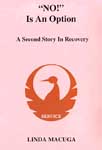No! is an Option: A Second Story in Recovery
Author: Linda Macuga OncoLink Rating: |
Linda Macuga's previous work entitled Promises in a New Life: Available to All Who Walk a Twelve Step Path introduced readers to a woman named Patricia Carter. This is the pseudonym of a real-life alcoholic who changed her life by applying the principles of a 12-step program to her life. In "No!" Is an Option: A Second Story in Recovery, we are reunited with Pat, a recovering alcoholic who faces a battle with cancer by applying those same principles to her life.
The first chapter familiarizes the reader to Pat and her past. She relays many tough times, as Pat struggled through a divorce, her two daughters moving away to live with their father, drunk-driving accidents, the loss of a job, and the loss of a good friend. We join Pat as, several days after turning 49, she notices a lump in her breast. The book then delves into the way Pat chooses to live her life with the discovery of her breast cancer by applying the ideals of an AA 12-step program to her day-to-day existence. A few recurring ideals are not keeping secrets, and overcoming one's fears about oneself by helping others.
There are many themes that weave their way through the pages of this book. One is struggling with the choice of whether or not to undergo therapy for cancer. Another is finding support in friends and family. An important motif is the idea of doing things you've always wanted to do. Pat, for instance, visits the Grand Canyon. Also, an important theme is the value in learning from others. For example, the Native Americans Pat meets on her journey to the Grand Canyon teach her a simpler and less materialistic way of life. A final theme is the strengthening of her faith in God.
Pat shows the reader that in living with breast cancer, life does go on. The book concludes with Pat, having been sober for 11 years, and having lived with breast cancer for five years. She continues to have a troubled relationship with her father, and is able to help her daughter who was involved with an abusive man. Her life goes on as it had before.
The author does an excellent job in painting a picture of Pat for the reader. She uses a simple, stark brush, not flowery or showy, to depict a woman of courage and intelligence. She shows how following established guidelines helped propel her through the difficulty of dealing with cancer. As the author states: "The program fulfilled her need for self worth and made her life worth living."


